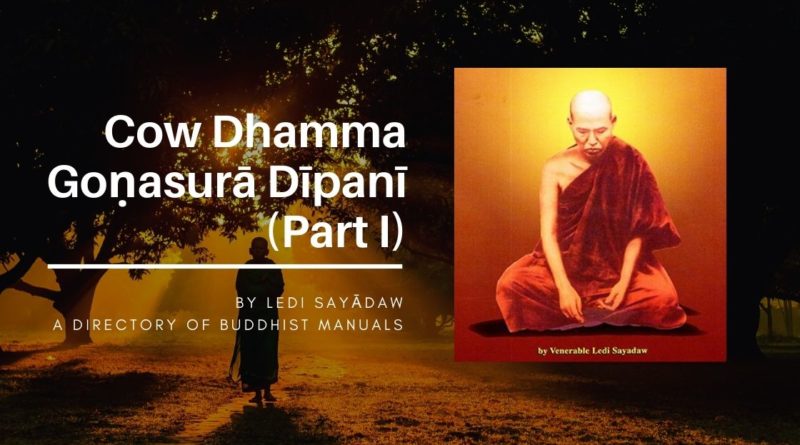Goṇasurā Dīpanī – Cow Dhamma In Detail – Ledi Sayadaw
MAIN CONTENT
- Cow Dhamma in Detail
- Comparison of Cows to Parents or Relatives
- Providers of Life, Beauty, Bliss, and Strength
- Deities Protect Good People
- Deities Fail to Protect Ungrateful People
- The Teaching in the Nārada Jātaka
- Morality, Wisdom, and Goodness
- Impracticability of Vegetarianism
- Thirty-Eight Blessings
- Importance of Gratitude
- Love and Compassion
- The End Justifies the Means
- The Power of Lust
- The Blessing of Gratitude
Cow Dhamma in Detail
Comparison of Cows to Parents or Relatives
Soon after a child is born, soft pressed rice is given with cow’s milk. So cows give life twice a day. Since then a human being’s life is dependent on cows and buffalos. As draught animals, they help to produce rice and other food so that a man becomes wealthy. A wealthy man can donate schools and monasteries, or build pagodas. These charitable deeds are possible with the aid of draught animals. Cows give both life and wealth to human beings.
The immense debt of gratitude must be seen in the labour and service of cows. Their help resembles that of our parents. Since one readily acknowledges the immeasurable debt of gratitude due to one’s father and mother, one should be able to declare the same thing regarding cows. The debt one owes to them is obvious. So the Pāḷi text states, “Cattle are like a man’s father and mother.” The Buddha also declares that “… cattle resemble brothers, sons, daughters, and relatives.” No good man will kill or torture his own relatives. Nor will he allow others to kill or torture them. He cannot bear to see them killed, because he loves his relatives.
Likewise a good person, knowing the power or debt of gratitude one owes to others, will not torture his draught animals. If news of torture and killing is known, he will feel sad. He may become angry. One would not eat the flesh of one’s relatives if they are killed by others — one will not relish eating their meat at all. One will feel sorry for the dead animals. The habit of gratitude and compassion suppresses any pleasure of eating beef. Compassion will also arise. One’s indebtedness is acknowledged by thoughts, words, and deeds.
Providers of Life, Beauty, Bliss, and Strength
No explanation is necessary as the meaning is obvious.
Deities Protect Good People
As explained earlier, the qualities of a good person include gratitude. Gratitude is revered by deities such as Sakka, the king of gods. They always appreciate this noble quality. They know that cows resemble one’s own parents. Cows possess honourable features and human beings owe them a great debt of gratitude. Those who kill them and eat their meat violate the essential virtue of a good man. This transgression of virtue is subtle and deep. It destroys the deepest ethical rule, which is hard to understand by superficial thinking. The deities, being of higher nature, know the importance of gratitude. Killers of draught animals and eaters of their flesh attract the hatred of good deities. Man exhibits callousness because of intense greed and delusion.
Every country needs a government. A country that lacks a government suffers from anarchic chaos. Robbers, murderers, and rebels gain supremacy and wreak havoc in various parts of the country. When a stable, strong government is duly established, disruptive elements have no chance to make mischief. They therefore remain at peace. Whenever authority is absent, miscreants rob and kill as they like. A strong government means peace and security. Likewise, when a country is looked after by good deities, demons and ghosts cannot do evil to the population. Bad deities have no chance to wreak havoc among the people. In times when people show no gratitude, even good deities are displeased, and they neglect to look after the world. Then demons, ghosts, and bad deities take their chance for evil-doing. They spread disease, epidemics, calamities, etc., and when the victims die they suck their blood and eat their flesh.
Deities Fail to Protect Ungrateful People
The fourth point indicates the neglect of good deities, such as personal deities, home deities, village deities, city deities, etc., who neglect their duty to protect the welfare of human beings. Then demons spread old and new diseases among men and animals. This is the detailed explanation for third point too. Man’s ingratitude makes the world a bleak place.
Villagers and farmers usually earn their livelihood with the labour of cows and buffalos. So one can say that half of the wealth derived from the land belongs to animals. If a single field produces one hundred baskets of paddy, half of this is owed to animals. If a person earns one pound by fast conveyance, half of this is the property of the oxen. Therefore owners must feed their animals properly and treat them kindly. They must use the labour of animals only after treating them with due consideration. They must treat them as if they are their friends, brothers, or sons. In short, in earning a livelihood, love and kindness must prevail so that the half-share due to them can be used by the owners themselves. Otherwise owners do not have the right to use their own half of the money earned. When old, animals must be left in peace and rest so that their debts to man are repaid. They must be properly fed in old age.
We have shown the teaching of the Nārada Jātaka in the sense indicated above. Without this good procedure, those who use all the money for themselves incur debts due to animals. It means that the owners and users must suffer in their countless future lives, to repay their burden of debt. These debts can multiply in countless ways through the long journey in saṃsāra. Fools who do not believe in future existences, brazenly torture and eat draught animals. They mercilessly abuse the labour of cows and buffalos so that the animals suffer as if in hell. Far-sighted persons should take this warning with all due seriousness.
The Teaching in the Nārada Jātaka
A tree, under which we shelter, becomes our benefactor, though it is an insentient thing. Having enjoyed protection from a tree, one must not destroy its branches or leaves. Wanton destruction means ingratitude just like using our best friend. Moreover, one commits the fault of breaking the virtue of a good person. This teaching of the Buddha¹ is as well-known as the sun and the moon. All persons should, therefore, treat draught animals with kindness, remembering their virtues and services. One should abstain from eating their meat, to fulfil the duty of gratitude. This factor of a good person must be maintained at all costs. Wherever human beings kill and eat their benefactors, they originate wars, conflicts, and atrocities. The calamity of war is due to this serious evil called ingratitude.
The term “Satthantara Kappa” means the calamity of war. A single slaughter-house kills at least one thousand cows each day, and over thirty thousand cows are butchered every month. In a year, more than three hundred thousand cows are slaughtered — over three million in ten years. In the whole country, the appalling slaughter of cows, each day, month, and year should be considered. For the animals, the greatest calamity befalls them without respite, day and night.
The butcher’s money becomes capital for the meat-traders and slaughter-houses. The consumer’s money also goes to them. With this huge income, meat-traders again buy animals for slaughter. They establish more and more slaughter-houses. In a single country there may be more than one thousand slaughter-houses. With the financial-support of meat-traders and consumers, the slaughter of animals is supported by meat-eaters everywhere. So the calamity of a single cow’s death is caused by man. Man seldom considers the fact of indebtedness.
On the other hand, cows and buffalos give rice, wheat, barley, etc., to mankind. Farmers rely on them. With their labour, they sustain the life of man every day. Yet callous human beings exploit them by creating slaughter-houses, and devise all ways of killing them for their meat. So these animals suffer the calamity of death due to the ingratitude of man. In the entire world, millions of cows are butchered for food every day.
Morality, Wisdom, and Goodness
In the Vinaya Piṭaka there is no prohibition to refrain from eating meat. For the monks, if they have not seen, heard, or suspected that the meat was killed for them, they can eat it. They are free from any offence. However, mere freedom from offence does not make a good monk. The essential factors of a good monk must be observed. The Vinaya rules do not forbid meat or beef as long as the above three factors are absent. However, the Vinaya rules only govern impurities of the bodily and vocal spheres. They concern only one of the four types of purification. A bhikkhu also has to follow the remaining three Parisuddhi Sīla. As these three — controlling the senses, purity of livelihood, and reflection on the use of requisites — belong to the Sutta Dhamma, a monk should conform to it so that all four kinds of purity are attained.
Here, it is important to relate morality to goodness. A bhikkhu, when he observes all four purities, attains only the qualification of a moral person. He also needs to enrich his mind with a liberal spirit such as appreciation and acknowledgement of gratitude. This enrichment of the mind or mental sphere ensures that a good heart emerges along with good conduct. Many individuals lack this mental factor although they possess morality. The qualities of a good person must be cultivated.
A further explanation of this point may be helpful. If a monk is well-versed in Vinaya and observes the discipline, he is classified as a moral monk. Yet he may be of rough mind, full of pride, stubborn, rebellious against his teachers, giving no support to the needy and no help to his elderly parents. He is always scolding and complaining. Jealousy and envy prevail in his heart. He exhibits egoism and conceit, wallowing in fame and wealth.
From his practice of the Pātimokkha Sīla, he is a moral person in this respect. However, he is very far from the basic characteristics of goodness as mentioned in the Metta Sutta (the fifteen points of becoming a good person). So, though moral, he is not good. Those types of monks, learned in the scriptures but proud and conceited, can only be called learned bhikkhus. However, they are not good in the sense indicated above.
This standard can also be applied to the laity. Those laymen who observe five precepts can only be classified as moral persons. For example, they observe the ‘non-killing’ precept by refraining from killing sentient beings, not having any intention to kill. Although by his acts some insects, pests, and other animals may suffer death, he escapes from the transgression of this precept as his intention is not based on killing. There is in this case, no evil deed even though death occurs to pests and animals. With other intentions he perpetrates a deed that involves death to others, such as clearing fields, burning rubbish and groves. By so doing, small pests are killed, but his aim is to clear the jungle or overgrowth, so he escapes evil in this act. He burns the fields, causing death to some sentient beings, but having a different intention, he escapes the evil of killing. Although thousands of insects may die, he has no responsibility for their death as his aim is to clear the fields or rubbish. It is right. He does not violate the first precept. He is still a moral person, because he has no intention to kill. However, if he knows that burning his fields or groves entails death to small animals, if he does this, he lacks love and compassion. So he is not a good person.
Some people carefully observe all five precepts, but they neglect to support their parents. They fail to pay respect to them. They scold learned men. They decide cases in a partial way. They oppress their inferiors. As they keep five precepts they are called “moral.” However, since they lack gratitude, humility, dutiful conduct, etc., they are not good persons at all. They lack the important factors of love and compassion.
If one knows that meat is served for one’s enjoyment, without seeing the act of killing, without suspicion or without direct involvement, ethical conduct is not sullied. So meat-eaters, although they know that cows are killed for food and that butchers prosper with the increasing demand, do not break the five precepts. It is just like the persons who, wishing to clear the jungle, burn bushes, trees, and groves, killing insects and animals in the process. Since they have no intention to kill, they are innocent.
Meat-eaters do not possess the factors of gratitude and compassion, and they are far from becoming good persons. The deed of eating is not a profound act. What is significant though, with grave consequences, is the financial help given to the slaughter-houses and meat-suppliers. The suppliers can maintain their businesses due to the purchasing power of the meat-eaters. Butchers kill more and more animals to meet the increasing demand, day and night. This fact is known to all.
The above case resembles the case of a moral farmer, who supports five people and who burns the fields and groves, thereby killing thousands of pests and animals. One is ethical, but at the same time one is not good.
Monks who try to observe the Vinaya rules, only gain purity of body and speech. They must observe the Vinaya rules since the Buddha alone is competent to promulgate them. The Vinaya rules are issued from the Buddha’s authority, that is the power of command. Monks breaking the Vinaya rules incur the guilt known as rebellion against the Buddha’s command (nāvītikkamma). This danger is always present. So when the Buddha allows meat with the three-fold purity to be taken by the monks, the monks have to obey. Moreover, the monks have to beg for food, relying on the help of the laity. They cannot refuse what has been offered on their daily almsround.
Impracticability of Vegetarianism
Everywhere, vegetarians constitute a small minority. If the Buddha prohibited meat for the monks, the majority of monks would unavoidably violate this Vinaya rule. Then transgressions would increase in the course of earning a livelihood. Those monks who insist on vegetarian food would be opposed by the populace, and their livelihood would become restricted. People will find difficulty to meet their requirements. Its impracticability prevented the Buddha from promulgating vegetarianism in the Vinaya Piṭaka.
In the Vinaya Piṭaka, meat-eating is allowed if the right kind of meat is given. The observance of the Vinaya rules² is limited for it purifies only bodily and vocal misconduct. It does yet reach the sphere of purification of mental evils which encompass a wide range. In the Sutta Piṭaka, ethical precepts and practices reach the mental realm. It covers all mental evils. Only when mental evils are purified, goodness arises. A person now becomes good, not merely moral or ethical. This attainment is possible because the factors of gratitude, loving-kindness, compassion, sympathetic-joy, and equanimity prevail in the heart. The heart must be cleansed of evil things to become good.
The above explanations have been briefly made in the first point also. Right understanding is necessary regarding the gratitude owed to cows and buffalos. Morality alone is not enough — mental purity must be the goal.
Thirty-Eight Blessings
To acknowledge indebtedness or gratitude is to follow the Maṅgala Dhammā (the thirty-eight blessings). When these Maṅgala Dhammā are known and understood, craving for meat, such as beef, etc., will diminish in due course. Everyone should try to avoid eating the flesh of animals, especially that of cows and buffalos. One should study the Suttanipāta, Temiya Jātaka, and Nārada Jātaka in which the importance of gratitude is taught by the Buddha, even towards trees and animals, so that this moral precept is not violated by wrong view. Magnanimity must prevail in the world. Indebtedness must be seen everywhere.
Importance of Gratitude
Even animals have gratitude for their mothers and feeders. They show love and gratitude when food is given to them. Even wild animals become tame if people feed them with kindness. They love their benefactors and show loyalty and devotion. It is strange that meat-eaters do not love cows — showing them no civility. It is remarkable that meat-eaters do not show gratitude even though they eat the flesh of animals. Yet animals show love and gratitude to human-beings. They do not receive kindness and gratitude in return, even though they serve the people. Human beings do not show much humanity.
The factors of gratitude, love, and compassion can arise even in fierce animals such as lions, tigers, snakes etc., who live in the wild. Those who live in the villages become tame and show gratitude toward human beings. Yet these three virtues are often absent among the people. Buddhists should display these three factors of goodness. Those who live by the labour of animals must cultivate the three good factors habitually.
Those who have little faith but plenty of delusion, differentiate between high and low-class persons in the matter of gratitude for benefits received. Their minds are not clear and steady. Thus they will often acknowledge and speak in praise of gratitude received from high-class persons, though the amount is small. They exaggerate the facts to honour people in high positions in an ingratiating way. The high-ranking person is praised out of all proportion. A dignified person is acknowledge with thanks a thousand-fold, although the deed is small, wild hyperboles are made by fools to those of high-status.
Fools do not show any appreciation when they receive help from low-class persons and beings, even though the benefit is great. They belittle the amount of benefit received. A thousand pounds worth of benefit is reduced to only twenty-five. Sometimes they totally ignore the help received from others. If their benefactors lack position, power, wealth, etc., they show even less gratitude. They dismiss the debt of gratitude that is due, concealing the benefit received. They do not help their benefactors when they are in need. They now shun them. They are glad when their benefactor dies because they do not want to repay their debt.
So the gratitude owed to animals is often denied. One seldom reflects on or acknowledges one’s debts to animals, not even to the smallest extent. As cows have no status, being dumb animals, people neglect to show any gratitude. The virtue of gratitude therefore diminishes, promoting vanity and folly among mankind, and callousness spreads. People become partial towards the upper class and biased against those of lower class. Dignified persons receive undeserved praise and exaggerated gratitude, while low-class benefactors are belittled, or totally ignored. Because it imparts righteousness, the importance of gratitude even towards trees was taught by the Buddha. The Pāḷi text “Yassa rukkhassa sāyāra” teaches us to preserve gratitude even for non-sentient things like trees. People should not destroy trees, because they enjoy shelter under them. People should not say unkind words. This is the teachings of the Bodhisattas and the Buddhas. They habitually practise this virtue.
Among the various good deeds deserving gratitude, the giving of sustenance ranks in the highest class. So man owes gratitude to cows in the same way as to parents. Cows are like our fathers and mothers. It is very strange that man, having enjoyed the services of animals at will, still delights in eating their flesh. Old cows are killed or sent to slaughter-houses. The gratitude that is prevalent among animals is absent among mankind. People lack genuine faith, and hold wrong views to the fullest extent. It is hard to realise the truth of gratitude. Seeing meat-eaters, one can know their lack of loving-kindness and compassion. Lacking loving-kindness and compassion, they discard also a sense of gratitude, a fundamental characteristic to become a good person.
Love and Compassion
When gratitude arises, love and compassion are sure to follow in its wake. Seeing meat, one will see the flesh of ones’ own parents. Cows’ flesh is comparable to the flesh of one’s own brothers and sisters, sons and daughters. Visions of one’s parents will appear in the mind. So instead of eating, one will certainly cry. One will not touch beef. Since past thankfulness reappear now. This is the way of a good person’s heart and conduct.
On the other hand, if owners use the labour of draught animals, and then eat their flesh, the honour and dignity of animals is reduced to the lowest order. Although man owes limitless gratitude to cows, not the least acknowledgement appears. Man’s lust for eating meat overwhelms all gratitude. When one remembers how the Buddha honoured the Tree of Enlightenment for seven days by showing his gratitude, such behaviour towards cows becomes incomprehensible. The depth of folly is unfathomable, if ingratitude reigns supreme.
The End Justifies the Means
Those who hold Khattavijja Diṭṭhi think that the end justifies the means. They have a selfish outlook, and only pragmatic considerations of usefulness or benefit prevail. Meat-eaters also belong to this group. The Buddha’s teaching is based on love and compassion, which are the outcome of gratitude. It cannot discard the outlook and behaviour of indebtedness. The right attitude must not be lost. Everyone should consider the service rendered by cows. The next consideration must be based on the following thought: “If cows were high-status persons or honourable, how one’s gratitude would multiply! Though they derive great service and milk from them, people do not rate them highly, let alone speaking in praise of cows. If only cows had rank and position!”
If cows were high ranking persons, everyone would show the gratitude due to them. People would show love and kindness to the fullest extent. Torture and killing of cows would not be allowed. Even the sight of their flesh would arouse pity. Considering thus, much gratitude will be heaped on them with love and compassion. With this strong pure mind the teaching of “Yassa rukkhassa sāyāra” will be implemented. Hence the factor of a good person is realised.
The Power of Lust
Lust for food compels some to eat even dogs and crows. At first, no one wishes to eat crows, since they are regarded as unclean. Dogs eat dirty things. Yet one enjoys pork, chicken, etc., though pigs and chickens eat bad things too. Without familiarity, no one will eat human flesh, but once people started, it would become a daily dish. Soon after a child is born, parents feed it beef, chicken, etc., so people enjoy meat, instead of loathing it. Similarly, if there were such a custom, people would eat their own father and mother with relish, or they would enjoy the flesh of their own sons and daughters. Once any food becomes familiar, even the flesh of dogs becomes tasty. The power of lust has no limits. Lust for food, like lust for sensual pleasures, continually wants to try new dishes. Man can become as lustful as a dog. The unrestrained carnal lust for sex and food is obvious in animals. The root cause is lust, with no special distinction between men and animals. So by reflecting on gratitude, one should avoid eating the flesh of cows and buffalos.
The Blessing of Gratitude
In the Suttanipāta the Buddha teaches: “yathā mātā pitā bhātā, aññe vāpi ca ñātakā.” The meaning is that cows and buffalos, being providers of rice and other food, are givers of life. They are comparable to one’s mother and father. If people can eat their parents’ flesh, they will also eat meat. If they will not eat their parents flesh, they should refrain from eating meat. If one heard that a man had eaten his parents, he would be regarded as an inhuman monster, maniac, or cannibal. Similarly, on hearing that people eat the flesh of cows and buffalos, one can judge that they are monsters, maniacs, or barbarians. Why is this? Because one’s parents are one’s life-givers and benefactors. So too are cows and buffalos. The flesh of one’s benefactors must not be eaten. People would rightly blame those who ate their parents, brothers, or sisters as barbaric cannibals. The same criticism should be levelled at meat-eaters because cows give us life. We owe them a great debt of gratitude, similar to that due to our parents. We should love these animals, considering their services to mankind. They are worthy of our noble love and pity, considering their enormous service for mankind.³








